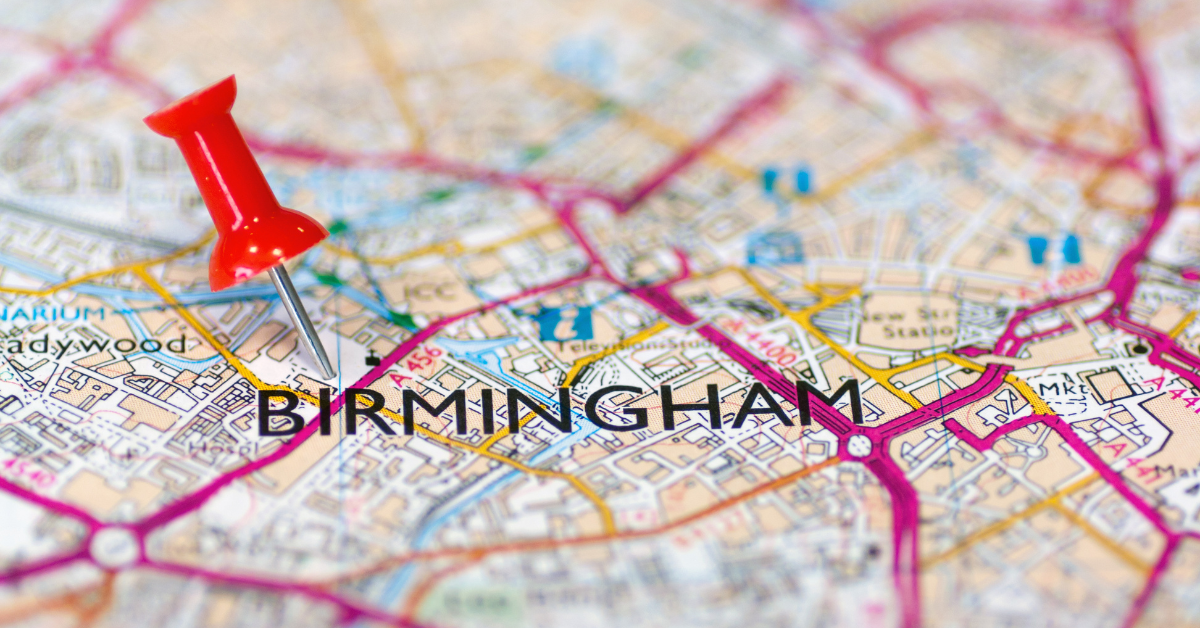Birmingham, the second-largest city in the UK, is written as “バーミンガム” in Japanese but as “伯明翰” in Chinese. This difference comes from language systems that prioritize sound over meaning. In this article, we compare how the two languages represent city names and highlight key points that foreigners often misunderstand.
- What Kind of City is Birmingham?
- What Does the Chinese Character Notation “伯明翰” Mean?
- Differences Between Japanese and Chinese City Name Notations
- Why Are Foreign Place Names Transliterated?
- The History of Transliteration of Foreign Names
- Features of Katakana Notation in Japanese
- Key Points for Foreign Readers
- Conclusion
What Kind of City is Birmingham?
Birmingham is a major city located in the Midlands of England, with a population exceeding one million. It developed as the center of the Industrial Revolution and contributed greatly to the advancement of steel and machinery industries, which earned it the nickname “the Workshop of the World.”
Today, Birmingham is highly regarded not only as an industrial city but also as a center of education, finance, and culture. The University of Birmingham is internationally recognized and attracts many foreign students each year. The city also thrives in music and the arts, with symphony orchestras, theaters, and cultural institutions deeply rooted in daily life.
In Japanese, the city is written as “バーミンガム” in Katakana. This is a phonetic notation system that represents sound rather than meaning, aiming to approximate the English pronunciation.
What Does the Chinese Character Notation “伯明翰” Mean?
In Chinese, foreign place names are often written using characters chosen for their sound rather than their meaning. In the case of Birmingham, the characters “伯明翰” are used, which represent an approximation of the English word “Birmingham.”
| Character | Pronunciation (Pinyin) | Main Meaning |
|---|---|---|
| 伯 | bó | Elder, senior, chief |
| 明 | míng | Bright, clear, intelligent |
| 翰 | hàn | Brush, feather, literature |
Each character has its own meaning, but they are unrelated to the city itself. The combination was chosen solely to represent the sound, so there is no deeper meaning behind this notation.
Differences Between Japanese and Chinese City Name Notations
In Japanese, foreign city names are typically written in Katakana, which focuses purely on reproducing sound. In contrast, since Chinese does not use the alphabet, foreign names are expressed through Chinese characters that approximate pronunciation.
| English | Chinese | Japanese |
|---|---|---|
| London | 伦敦 (Lúndūn) | ロンドン (Rondon) |
| Paris | 巴黎 (Bālǐ) | パリ (Pari) |
| New York | 纽约 (Niǔyuē) | ニューヨーク (Nyūyōku) |
| Birmingham | 伯明翰 (Bómínghàn) | バーミンガム (Bāmingamu) |
Thus, Japanese focuses on sound reproduction with Katakana, while Chinese uses characters that look meaningful but function phonetically.
Why Are Foreign Place Names Transliterated?
The reason Chinese transliterates foreign place names is that it does not use the alphabet. Instead, characters with similar sounds are selected to approximate the foreign pronunciation.
| English Name | Chinese Transliteration | Relation to Meaning |
|---|---|---|
| John | 约翰 (Yuēhàn) | Focus on sound, not meaning |
| Tokyo | 东京 (Dōngjīng) | An exception that literally means “Eastern Capital” |
| Buddha | 佛陀 (Fótuó) | Phonetic borrowing that became a fixed Buddhist term |
In most cases, sound takes precedence over meaning, though in some special cases, meaning may also be reflected.
The History of Transliteration of Foreign Names
The practice of transliterating foreign names has a long history. During the Silk Road era, foreign names were converted into Chinese characters. Similarly, Indian Buddhist terms were introduced into China using phonetic transcription. For example, “Buddha” was rendered as “佛陀.”
| Original | Chinese Transliteration | Notes |
|---|---|---|
| Buddha | 佛陀 (Fótuó) | Established Buddhist terminology |
| Caesar | 凯撒 (Kǎisā) | Roman emperor’s name |
| Jesus | 耶稣 (Yēsū) | Christian terminology |
Thus, transliteration has a long tradition as a way to adapt foreign sounds into local writing systems.
Features of Katakana Notation in Japanese
Although Japanese uses Chinese characters (Kanji), it relies on Katakana, a phonetic script, for writing foreign words. Katakana represents sounds directly and does not assign meaning.
| English | Katakana Notation | Features |
|---|---|---|
| Coffee | コーヒー (Kōhī) | Example of borrowed vocabulary |
| Computer | コンピュータ (Konpyūta) | Common in technical terms |
| London | ロンドン (Rondon) | Place names are phonetic |
Katakana’s lack of inherent meaning makes it especially suitable for adopting foreign words directly as sounds.
Key Points for Foreign Readers
Foreigners should note that 伯明翰 is not a translation with meaning, but a phonetic transcription.
Key takeaways:
- 伯明翰 is the Chinese transliteration and is not used in Japanese.
- In Japanese, the city is written in Katakana as バーミンガム.
- The meanings of the characters are irrelevant; they are chosen only for their sounds.
- Other city names (伦敦, 巴黎, etc.) follow the same system.
- Understanding this prevents misinterpretations of city names across languages.
Conclusion
In Japanese, Birmingham is written as “バーミンガム,” while in Chinese it is transliterated as “伯明翰.” Although Chinese characters inherently carry meaning, in this case, the characters are chosen solely for their sound, not for meaning.
The way foreign place names are represented differs by language: Japanese uses Katakana, and Chinese uses characters. Understanding this distinction helps us grasp not only linguistic differences but also cultural approaches to language. This awareness is essential for accurate and respectful cross-cultural communication.






